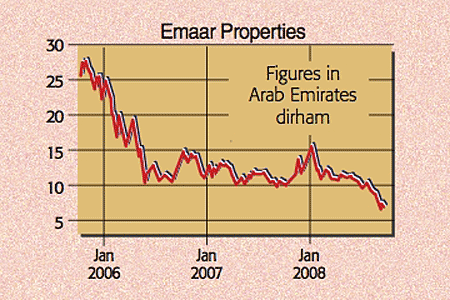
Dubai’s builders must have nerves of steel. In the week that emerging markets saw their biggest one-day fall in 20 years, the country has unveiled a $38bn plan to build the world’s tallest tower and inland harbour. The 200-floor tower will reach 1km into the Dubai skyline, dwarfing the as-yet-unfinished 881m Burj Dubai, a couple of miles along the waterfront. Chairman of Dubai World, Ahmed Bin Sulayem, boasted: “It sends another message to the world that Dubai has a vision like no other place on earth.”
That’s certainly true. And foreign investors have been quite happy to play along. For years, bankers in London have been spending bonuses on Dubai’s luxury condos. And in a year when only seven global stockmarkets have made money, according to the MSCI, the Gulf States have emerged as among the world’s best-performing economies. With investors desperate for a safe place to put their money, it’s small wonder many are hailing the Middle East and Africa as the only safe havens left.
But this fantasy is based on two dangerous myths. The first is that the Middle East is isolated from the turmoil in global markets. Western and Arab markets are far more intertwined than they were in the 1970s, notes Andrew Lee Butters in Time magazine, not least because Gulf States have been bankrolling the US by buying up government debt every time the Fed asked them to. But there is also evidence that the credit crisis has spread to the region. Banks are running out of capital, says Una Galani on Breakingviews, and many are struggling to lend ambitious developers the cash they need to finance their projects (see below). The cost of that financing is escalating rapidly. In just three months, the spread on Dubai’s credit default swaps has doubled. Just last week, Dubai had to turn to its oil-rich sister Abu Dhabi for $15bn to bail out its struggling banks.
The second dangerous myth is that the Gulf’s massive oil wealth will see it through. Having built up a huge cash pile as oil scaled $145 a barrel, the consensus is that crude would have to fall back to $50 or $60 before Gulf States have to slash their budgets. But the lesson from China, says Kathryn Cooper in The Sunday Times, is that even if you keep the economy ticking along nicely, it doesn’t mean stockmarkets can’t collapse. And it looks as if that’s already happening. On Monday, the Saudi Arabian market fell 9.8%, followed by Dubai, down 7.6%. The falls were led by real-estate firms in Dubai, says Andrew England in the FT.
So ignore talk that the Gulf will be immune to a global sell-off. The truth is that when markets are diving like this, nowhere is safe. And the fallout will be felt a lot further away than the Gulf. For years, the Gulf States have been pouring money into North Africa to finance infrastructure building. But it can’t continue. It’s hard to see how the UAE can follow through with its plans to pump $30bn into Tunisia over the next ten years, for example. As bad deals pile up at home, investors in Gulf and North African funds will pull their money out, and Dubai’s dream of kilometre-high towers and occupied islands shaped like palm trees will be cut off at the root.
The true state of Dubai’s real estate
Even before the $38bn plan to build the Nakheel Harbour and Tower was unveiled, developers were shifting in their seats, says Simeon Kerr in the FT. In recent years, the event has been full as investors flocked to see Dubai’s latest development schemes. “This year, the organisers had no trouble keeping the public out”.
They were right to stay away. With the Dubai stockmarket down 38% this year, and real-estate developers such as Emaar Properties leading the fall, and with no oil reserves to back its building plans, Dubai is the Gulf’s most exposed economy. It may be able to rely on oil-rich Abu Dhabi to bail it out of the worst of its troubles. But with banks running out of capital, Dubai’s six-year building odyssey could soon be over. Large island projects are being postponed and construction of the world’s largest airport is falling behind schedule. Even the Nakheel developer will have to cancel projects as it struggles to refinance a $3.5bn debt mountain, says Galani on Breakingviews. As for residential property, Morgan Stanley said in August that property prices in Dubai (up by 79% since the start of 2007) will fall by 10% by 2010. Andrew Critchlow of Zawya Dow Jones reckons prices could fall by “anything up to 50% if the toxic economic spillage in the US cannot be contained” as rising costs put a stop to firms relocating staff to the region.